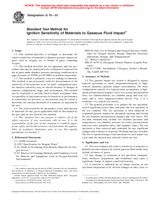Potrebujeme váš súhlas na využitie jednotlivých dát, aby sa vám okrem iného mohli ukazovať informácie týkajúce sa vašich záujmov. Súhlas udelíte kliknutím na tlačidlo „OK“.
ASTM G74-01
Standard Test Method for Ignition Sensitivity of Materials to Gaseous Fluid Impact
Automaticky preložený názov:
Štandardná skúšobná metóda pre zapaľovanie Citlivosť materiálov na plynný Fluid Impact
NORMA vydaná dňa 10.9.2001
Informácie o norme:
Označenie normy: ASTM G74-01
Poznámka: NEPLATNÁ
Dátum vydania normy: 10.9.2001
Kód tovaru: NS-57804
Počet strán: 7
Približná hmotnosť: 21 g (0.05 libier)
Krajina: Americká technická norma
Kategória: Technické normy ASTM
Anotácia textu normy ASTM G74-01 :
Keywords:
gaseous fluid impact, ignition sensitivity, oxygen enriched environment, ICS Number Code 13.220.40 (Ignitability and burning behaviour of materials and products), 13.230 (Explosion protection)
Doplňujúce informácie
| Significance and Use | ||||||||||||||||||||||||||||||||||||||||||||||||||||||
|
This test evaluates the relative sensitivity of materials to dynamic pressure impacts by various gaseous fluid media (may include mixtures of gases). Any change or variations in test specimen configurations, thickness, preparation, and cleanliness may cause a significant change in impact sensitivity/reaction. A reaction is indicated by an abrupt increase in test specimen temperature or by obvious changes in odor, color, or material appearance, or a combination thereof, as observed during post test examinations. Odor alone is not considered positive evidence that a reaction has occurred. Suggested criteria for test completion at a given pressure are: 4.4.1 Each specimen is subjected to five impacts. 4.4.2 A material passes if no reactions occur in 20 successive samples. 4.4.3 A material fails if one reaction occurs in a maximum of 20 or fewer successive samples. Materials may be ranked by the maximum pressure (pressure threshold) at which they pass the test. Material acceptance may be on the basis of passing at a selected pressure. |
||||||||||||||||||||||||||||||||||||||||||||||||||||||
| 1. Scope | ||||||||||||||||||||||||||||||||||||||||||||||||||||||
|
1.1 This method describes a technique to determine the relative sensitivity of materials to dynamic pressure impacts by gases such as oxygen, air, or blends of gases containing oxygen. 1.2 This method describes the test apparatus and test procedures that may be employed in the evaluation of materials for use in gases under dynamic pressure operating conditions up to gage pressures of 10 000 psi (69 MPa) at ambient temperature. 1.3 This method is primarily a test for ranking of materials. This method is not necessarily valid for determination of the sensitivity of the materials in an "as-used" configuration since the material sensitivity may be altered because of changes in material configuration, usage, and environment. This method can be employed to provide batch-to-batch acceptance data. Acceptability of any material may be based on its performance at a particular test pressure, or test pressure may be varied to determine the reaction threshold of a material, as specified by the user. 1.4 The criteria used for the acceptance, retest, and rejection of materials for any given application shall be determined by the user and are not fixed by this method. 1.5 This standard does not purport to address all of the safety concerns, if any, associated with its use. It is the responsibility of the user of this standard to establish appropriate safety and health practices and determine the applicability of regulatory limitations prior to use. For specific precautions see Section 7. |
||||||||||||||||||||||||||||||||||||||||||||||||||||||
| 2. Referenced Documents | ||||||||||||||||||||||||||||||||||||||||||||||||||||||
|




 Cookies
Cookies
